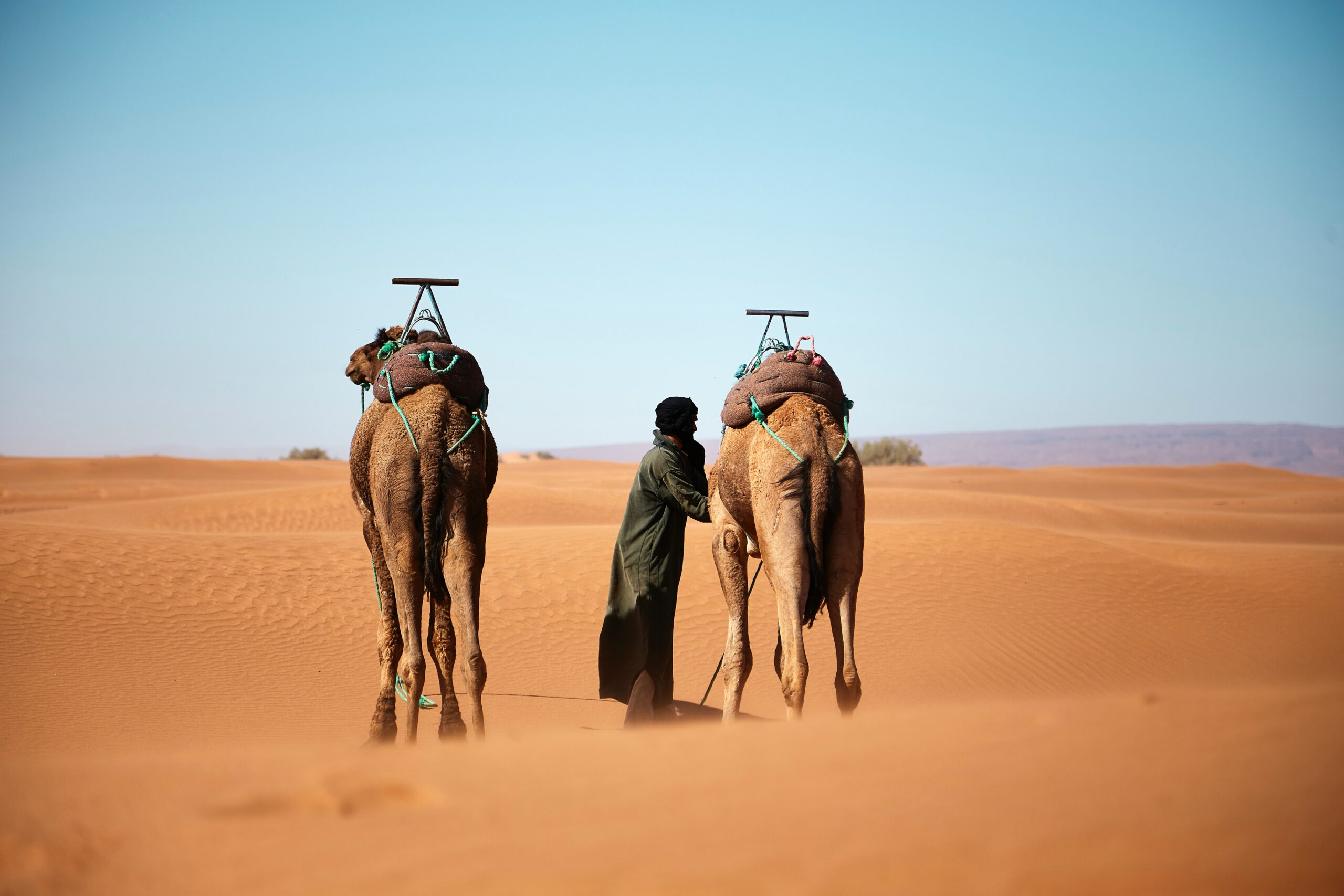One of the longest-standing humanitarian crises in the world resides in Western Sahara. Thousands of Sahrawis have been displaced in the conflict of national sovereignty between Morocco as an occupying force and the independence movement Frente Polisario. Inertia in the international community to negotiate an acceptable political solution has prolonged the stay of UN peacekeeping forces and created a situation of donor fatigue as well as substantial gaps in human rights monitoring in the Territory. Cornered and forgotten, generations of Sahrawi refugees continue to live nationless, defenseless and without hope for the future.
Often called Africa’s last colony, Western Sahara is situated between the Atlantic Ocean, Morocco and Mauritania. While having been recognized by the UN as a Non-Self-Governing Territory since 1963, the colonizing power Spain officially ceded administrative power over the territory to Morocco and Mauritania in 1975, which triggered an armed conflict with the indigenous people’s liberation movement, Frente Polisario. Under Morocco’s “peaceful occupation” of the territory, many Sahrawi refugees have settled in camps run by the Front or fled across the border to Algeria.
Over the last several decades, Western Sahara has gone through different stages of conflict and decolonization in efforts to relieve the situation. After Mauritania withdrew from the Territory in 1979 The United Nations Mission for the Referendum in Western Sahara (MINURSO) was established by the Security Council in 1991 in a settlement brokered between Morocco and the Frente Polisario. MINURSO’s mandate was to monitor the ceasefire and provide a preparation of a referendum where the people of Western Sahara could choose between independence or integration with Morocco. To this day, continued disputes between the main parties have stopped the referendum from taking place. Traditionally of nomadic culture, Sahrawis are now forced to live in a desolate land without any guarantee of livelihood. According to Oxfam, many refugees have no real chance of self-sufficiency without citizenship, living in the unforgiving arid desert with constant drought, lack of infrastructure, sandstorms and extreme heat of up to 55 °C during summer months.
In a letter sent to the UN Secretary General last September, the Frente Polisario Secretary General Ghali informed that “[…]the failure of the United Nations Secretariat and the Security Council to act robustly […] has […] undermined the credibility of the United Nations and deepened the loss of faith amid the Sahrawi people in the already fragile United Nations peace process”. Feelings of hopelessness among the people living in refugee camps have also been reported by international media outlets. As disclosed by Deutsche Welle from within one of the refugee camps in Algeria, Awserd, some 50,000 people live in tents, brick houses and mud shacks and struggle to organize schooling, health care, and the distribution of relief supplies. Inconsistencies in donor aid and resource shortfalls have become the main challenges for humanitarian actors trying to provide for the many refugees. According to the report of the UN Secretary General on the situation in Western Sahara released in September last year, UNHCR, UNICEF, and WFP only received about 58% of their combined needs for their 2020 regular programmes. Around 173,000 Sahrawis in the Sahara Desert near Algeria are forced to rely on aid relief and the same nine basic food supplies. Sadly, Oxfam warned in a press release in 2015 that many in the camps have developed chronic illnesses relating to their limited diet, such as diabetes, hypertension, anemia and malnutrition.
Although the final responsibility of resolving the conflict lies with the Moroccan Government and the Frente Polisario, the Sahrawi refugees’ current situation is impaired by weak solutions brokered by MINURSO and the Security Council under ambiguous international law on the right to self-determination. Oxfam, and scholars such as Walter et al. (2014) in the book Self-Determination and Secession in International Law, have accused previous negotiations of neglecting the right to a referendum by favouring technical solutions while glossing over the fact that the conflicting parties have publicly tried to manipulate the peace talks. As for the Frente Polisario, they have tried to invoke the principle of self-determination under national law, while Morocco at several occasions has opposed the liberation movement publicly by declaring historical sovereignty over Western Sahara. For example, at the 75th session of the Special Political and Decolonization Committee held between October and November in 2020, a Moroccan representative stressed that the Sahara had been Moroccan “since the dawn of time and will remain so until the end of time.”, according to a UN press release. At the same conference, representatives from Namibia and Algeria both expressed concerns that a resolution without the involvement of the people on the ground would only continue to deny the rights of the Sahrawi people.
In legal terms, it is remarkable that the human rights of the Sahrawi people have been cornered for so many decades. Sahrawis have nowhere to turn to report atrocities committed against them, and many national journalists who try to cover the situation are persecuted or silenced. Less media coverage has been argued by activists like Lena Thunberg, editor of the only nordic magazine in Western Sahara, to allow for the conflict resolutions to be watered down to toothless agreements. In the past, both the UN General Assembly and the International Court of Justice have rejected Morocco’s claim of sovereignty mainly on the grounds that Western Sahara was not a terra nullius unoccupied by people prior to annexation and had undocumented ties to its neighboring countries. Still, the 2,700 kilometer long sand berm built by the Moroccan Government to divide the Western Sahara has been uncontentious in international media.
Paradoxically, while unmonitored negotiations have postponed peace into the distant future, the responsibility of the international community to step up to respect and protect the rights of the Sahrawi people should be straightforward; In a paper published by Carlos Ruiz Miguel, a constitutional law professor at the University of Santiago de Compostela in Spain, Miguel claims that there is no doubt that Morocco’s occupation of West Sahara remains a serious violation of international law concerning the obligation to observe, respect and promote the right of self-determination. Walter et al.‘s (2014) analysis on the situation in Western Sahara also reinforces how Morocco has violated the prohibition of the use of force and aggression towards other states. Morocco’s obligations in relation to Western Sahara have also seen increased tension after Morocco was readmitted as a member state of the African Union in 2017, where Western Sahara is a recognized member of the union as the Sahrawi Arab Democratic Republic. Therefore, all obligations under the AU’s Constitutive Act are applicable in dealings between these members, independent of their mutual recognition as states under international law.
Moreover, in terms of taking a stand for the rights of the Sahrawi people, the European Union has had a vital role to play in the handling of Western Sahara due to bilateral cooperation with Morocco. Morocco thrives off exports from Western Sahara, a region that holds some of the largest phosphate reserves in the world and access to rich fishing waters with offshore gas and oil resources. The EU has legitimate reasons to stay on good terms with the kingdom for both these reasons, as well as the cooperation to reduce migratory flows and in the fight against terrorism in North Africa. However, according to a commentary piece by Hugh Lovatt on the European Council on Foreign Relations website, the biggest problem with the EU’s stance on Western Sahara has been to untangle the bilateral trade from international law. In December 2016, the Court of Justice of the European Union (CJEU) ruled that Western Sahara falls outside the scope of Morocco’s Association Agreement, which forms the basis of its trade relationship with the EU. However, the EU has not yet adopted the UN’s categorization of Western Sahara as an occupied territory. In reality, this ruling has meant that the EU has wrongfully allowed Morocco to include Western Sahara in its agreements with the EU on energy exports and fish and agricultural products at the expense of the rights of the Sahrawis.
It seems that in conflicts between nation states, the nationless people have become the forgotten victims at the mercy of the international community. In postponing the swift peace resolution between Morocco and the Frente Polisario by focusing on technical solutions and national interests, there is a great risk of neglecting the people whose lives are affected the most. The UN, the European Union and the African Union all have the undeniable responsibility to protect the Sahrawis and resolve the crisis they have had to endure in refugee camps for generations, waiting for the day they can return home.

Isabel Wilson
Writer for Utblick since autumn 2020





